The Argentine fight for human rights emerged from the ashes of the Dirty War, a period of state-sponsored terror that scarred the nation’s democratic fabric. Families of the disappeared refused to remain silent, taking to the streets in defiant marches that would inspire the world. While the path to justice and truth has been arduous, grassroots movements and international pressure have chipped away at the legacy of oppression. Uncovering the fate of the vanished and reclaiming public spaces once controlled by the military junta have become rallying cries for a society determined to consolidate its democratic future. What lessons can Argentina’s human rights struggle offer those seeking to fortify fragile democracies?
Good To Know
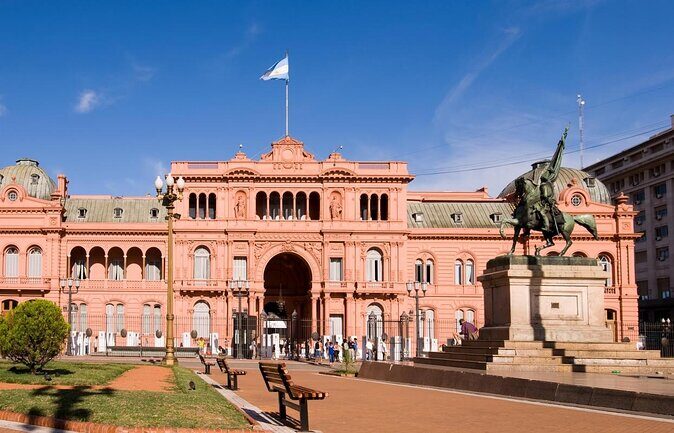
-
The Dirty War under military junta from 1976-1983 led to the disappearance of an estimated 30,000 people, sparking a fight for human rights and justice in Argentina.
-
Families of the disappeared victims spearheaded a decades-long movement, led by the Mothers of Plaza de Mayo, to uncover the truth and hold perpetrators accountable.
-
Grassroots organizations and activist groups mobilized citizens, transformed public spaces, and amplified victims’ voices to advance the human rights agenda during Argentina’s transition to democracy.
-
International pressure and scrutiny from human rights organizations were crucial in highlighting the atrocities and supporting Argentina’s efforts to investigate, prosecute, and ensure accountability.
-
Argentina’s experience in confronting its painful past offers valuable lessons for democratic consolidation, emphasizing the importance of rule of law, civic engagement, and a commitment to human rights.
Uncovering the Dirty War’s Legacy
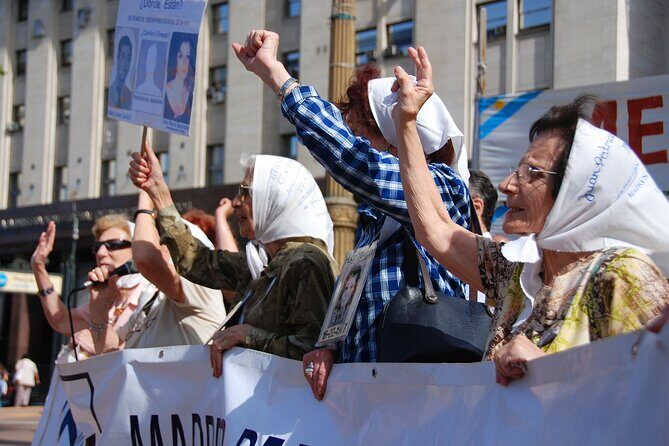
The Dirty War, a dark and repressive period in Argentina’s history, left a lasting impact on the nation. From 1976 to 1983, the military junta‘s brutal crackdown on dissent resulted in the disappearance of an estimated 30,000 people.
This tour explores the visible remnants of Argentina’s troubled past, shedding light on the atrocities committed and the fight for human rights that followed. Participants will gain a deeper understanding of the historical context and the marked scars it left on the country’s landscape and collective consciousness.
The tour aims to uncover this complex legacy, fostering reflection on the importance of democracy and the ongoing struggle to prevent such tragedies from recurring.
You can also read our reviews of more tours and experiences in Buenos Aires.
Remembering the Disappeared Victims
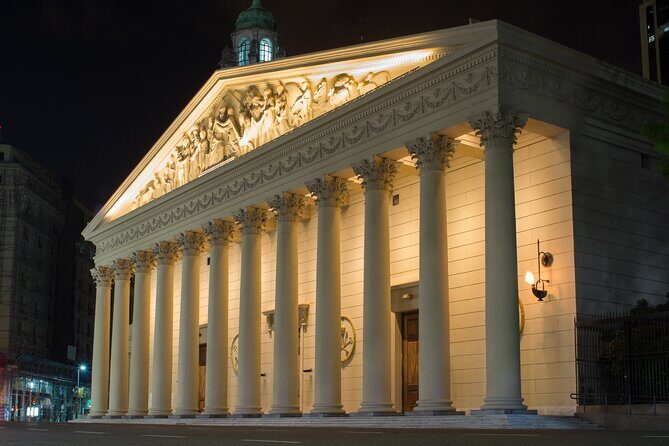
Etched into the collective memory of Argentina, the fate of the disappeared victims of the Dirty War stands as a somber reminder of the human rights atrocities committed during that dark period.
Thousands of civilians were abducted, tortured, and murdered by the military junta, their bodies often never recovered.
The anguish of their families, who endlessly searched for answers, has become a powerful symbol of the struggle for justice and accountability.
Today, efforts to uncover the truth and memorialize the disappeared continue, as Argentina confronts its painful past and works to build a more just and democratic future.
Marching for Justice and Truth
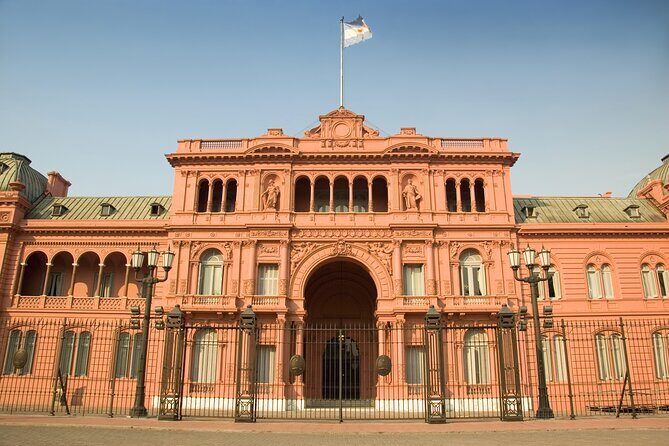
Argentina’s citizens have long taken to the streets, rallying together to demand justice and the truth for the victims of the Dirty War.
Mothers of the Disappeared, known as the Madres de Plaza de Mayo, have led powerful marches for decades, refusing to let the atrocities of the military dictatorship be forgotten.
Protesters march to the Plaza de Mayo, site of the presidential palace, carrying photos of their loved ones and calling for accountability.
Their unwavering dedication has kept the fight for human rights at the forefront of the nation’s consciousness, shaping Argentina’s transition to democracy and ensuring the victims’ stories are never silenced.
Reclaiming Public Spaces and Symbols
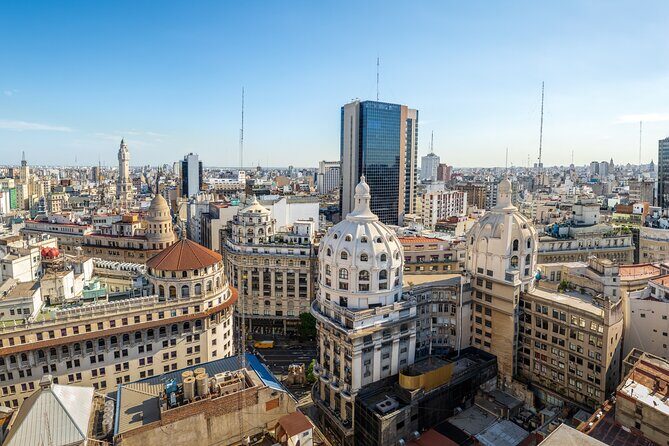
Throughout Argentina’s history, countless public spaces and national symbols have become physical manifestations of the country’s fraught past. Sites like the Plaza de Mayo, the Casa Rosada, and the Ministerio de Defensa bear witness to the military junta‘s repressive reign during the Dirty War.
However, grassroots efforts have reclaimed these spaces, transforming them into powerful symbols of resistance and hope. The Mothers of the Plaza de Mayo, for instance, have gathered weekly for decades, demanding justice and accountability.
Similarly, the monument to the fallen during the Malvinas War has become a site of remembrance and a call for peace. These reclaimed spaces serve as a reminder of the Argentine people’s unwavering spirit and their fight for democratic ideals.
Grassroots Movements and Activism
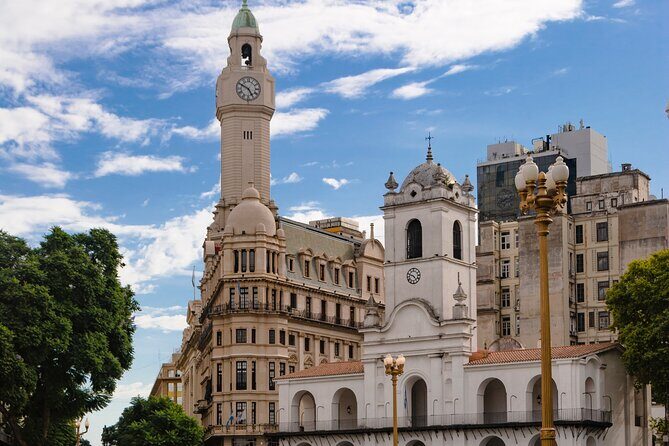
Countless grassroots movements and activists have spearheaded the fight for human rights in Argentina. From the Mothers of the Plaza de Mayo, who courageously demonstrated against the disappearance of their children during the Dirty War, to human rights organizations like the Center for Legal and Social Studies, citizens have mobilized to demand accountability and justice.
These groups have amplified the voices of the victims, pressured the government, and created spaces for public dialogue. Their unwavering commitment has been instrumental in exposing the truth, securing reparations, and ensuring the protection of fundamental rights.
The legacy of these grassroots efforts continues to inspire Argentinians in their pursuit of a more just and democratic society.
International Pressure and Accountability
Likewise, international scrutiny and pressure have proven pivotal in advancing human rights accountability in Argentina.
Condemnation from global bodies like the United Nations and international human rights organizations shone a spotlight on the atrocities of the military junta. This external pressure, coupled with domestic activism, compelled the government to investigate past abuses and prosecute those responsible.
On top of that, rulings from the Inter-American Court of Human Rights have set important legal precedents, holding Argentina accountable and spurring legislative reforms.
While challenges remain, international engagement has been instrumental in the country’s democratic transition and its ongoing quest for justice and reconciliation.
Lessons for Democratic Consolidation
The Argentine fight for human rights holds invaluable lessons for democratic consolidation. The country’s transition from dictatorship to democracy was fraught with challenges, yet Argentina emerged as a beacon of resilience.
The pursuit of justice and accountability, through initiatives like the CONADEP investigation, strengthened the rule of law and civic engagement.
On top of that, the active role of human rights organizations in shaping the democratization process underscores the importance of a vibrant civil society.
Argentina’s experience highlights that sustainable democracy requires a steadfast commitment to upholding human rights, fostering transparency, and empowering citizens to hold their government accountable.
Frequently Asked Questions
Is the Tour Suitable for Children Under 12 Years Old?
The tour may not be suitable for children under 12 years old, as it covers sensitive topics related to Argentina’s troubled past. The content and pace of the tour may not be appropriate for younger participants.
Can I Pay in Cash on the Day of the Tour?
Participants can pay in cash on the day of the tour. The tour provider accepts various payment methods, including cash, to provide flexibility for customers. However, it’s recommended to confirm the payment options when booking the tour.
Is Photography Allowed During the Tour?
Yes, photography is allowed during the tour. The tour overview states that "Most travelers can participate," indicating that standard tour activities like taking photos are permitted. However, guests should be mindful and respectful of any sensitive locations or situations.
What Is the Average Group Size for This Tour?
The group size for this tour varies, but it’s generally a small private tour. According to the overview, the price per person changes depending on the group size, indicating a flexible group arrangement.
Are There Any Dietary Restrictions or Allergies the Guide Should Know About?
The tour does not mention any specific dietary restrictions or allergies. However, it’s a good idea for participants to let the guide know about any special needs so they can accommodate them, if possible.
The Sum Up
The Argentine fight for human rights has been a powerful force in the country’s struggle to reclaim democracy and justice. From the Madres de Plaza de Mayo to grassroots movements, citizens have persistently challenged the legacy of oppression. International pressure and domestic activism have been instrumental in uncovering truths and memorializing victims, underscoring the essential link between human rights advocacy and the consolidation of a sustainable democratic society in Argentina.
More Tour Reviews in Buenos Aires
- 7-Day Classic Argentina Private Tour
- Private Workshop to Learn About Argentine Culture
- Private City Tour With Local Guide in Buenos Aires
- Buenos Aires: Tigre Premium With Boat Ride From Puerto Madero
- Cafe De Los Angelitos Tango Show Skip The Line Ticket Buenos Aires
- The Best Argentine Soccer Experience at La Bombonera
Not for you? Here's more nearby things to do in Buenos Aires we have reviewed
- 25 Best Guided Tours In Buenos Aires
- 25 Best Tours In Buenos Aires
- 3 Best Shore Excursions In Buenos Aires
- 7 Best Shopping Tours In Buenos Aires
- 16 Best Drinking Tours In Buenos Aires
- Traditional Argentine Asado in Palermo
- Piazzolla Tango Show and Dinner in Buenos Aires
- Arrival Private Transfers From EZEiza Airport EZE to Buenos Aires
- The Aljibe Tango Show (Optional Dinner)
- Discover La Plata: A Guided Architectural and Sightseeing Tour
- Skip the Line: Boca Juniors Museum and Tour: THE VIP BOMBONERA
- Milonga Dance Lesson and Tango History Tour
